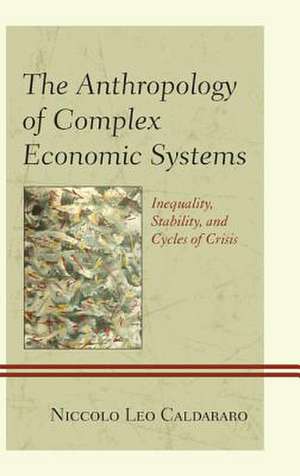The Anthropology of Complex Economic Systems
Autor Niccolo Leo Caldararoen Limba Engleză Paperback – 25 aug 2015
| Toate formatele și edițiile | Preț | Express |
|---|---|---|
| Paperback (1) | 492.19 lei 6-8 săpt. | |
| Rowman & Littlefield – 25 aug 2015 | 492.19 lei 6-8 săpt. | |
| Hardback (1) | 830.76 lei 6-8 săpt. | |
| Rowman & Littlefield – 14 noi 2013 | 830.76 lei 6-8 săpt. |
Preț: 492.19 lei
Nou
Puncte Express: 738
Preț estimativ în valută:
94.19€ • 97.98$ • 77.76£
94.19€ • 97.98$ • 77.76£
Carte tipărită la comandă
Livrare economică 15-29 aprilie
Preluare comenzi: 021 569.72.76
Specificații
ISBN-13: 9781498520553
ISBN-10: 1498520553
Pagini: 340
Ilustrații: 33 tables
Dimensiuni: 147 x 226 x 28 mm
Greutate: 0.52 kg
Editura: Rowman & Littlefield
ISBN-10: 1498520553
Pagini: 340
Ilustrații: 33 tables
Dimensiuni: 147 x 226 x 28 mm
Greutate: 0.52 kg
Editura: Rowman & Littlefield
Notă biografică
Cuprins
Preface
Acknowledgments
Introduction
Part I: Anthropology and Economics: A Review
Chapter 1: Anthropology and the Cosmology of Modern Economics
Chapter 2: Wants, Needs, and the Question of Surplus versus Wealth
Chapter 3: Complexity and Stability or Stagnation: Declining Returns and the Business Cycle
Chapter 4: Wealth, Consumption, Quality of Life & Standard of Living
Part II: Introduction to Hominid Economics
Chapter 6: Introduction
Chapter 7: Forest Fires, Origins, and Myths
Chapter 8: Traditional Peoples and Fire
Chapter 9: Climate and Fire, Assessing Time¿s Arrow and the Antiquity of Anthropogenic Fire
Chapter 10: Forest Management in Modern and Traditional Society
Chapter 11: The Degraded Environment and Homo Sapiens
Chapter 12: Co-evolutionary Processes & Environmental Exploitation
Chapter 13: Makeup and Nature of Forests: Fire-adapted Species vs `Old Growth¿
Chapter 14: Determining Fire History: Fire Scars, Fire Histories, and Thermal Alteration
Chapter 15: Insects, Biomass Reduction, and Pesticides
Chapter 16: Conclusion: Forests and the Future Man
Part III: Cycles of Growth & Collapse versus the Possibility of Sustainable Societies
Chapter 17: Introduction
Chapter 18: The Problem of Population & the Nature of Human Society
Chapter 19: Consumerism and Sustainability: Japan as an Example
Chapter 20: The Evolution of Modern Japan and its Transformation
Part IV: The Role of Ideology and Religious Precepts in the Containment and Change of Society: A Modernist View
Chapter 21: The Credit Crisis of 2008 to 201?
Chapter 22: Ideology and Religious Precepts and Motivations: Why People Work
Chapter 23: Fundamentalism versus Globalism
Part V: Conclusion
Bibliography
Index
About the Author
Descriere
By bringing together economic anthropology, ecology, and culture history, The Anthropology of Complex Economic Systems not only proposes a new model of human social evolution, but equally importantly creates a methodology for speaking to, and against, our present economic and environmental situation.
